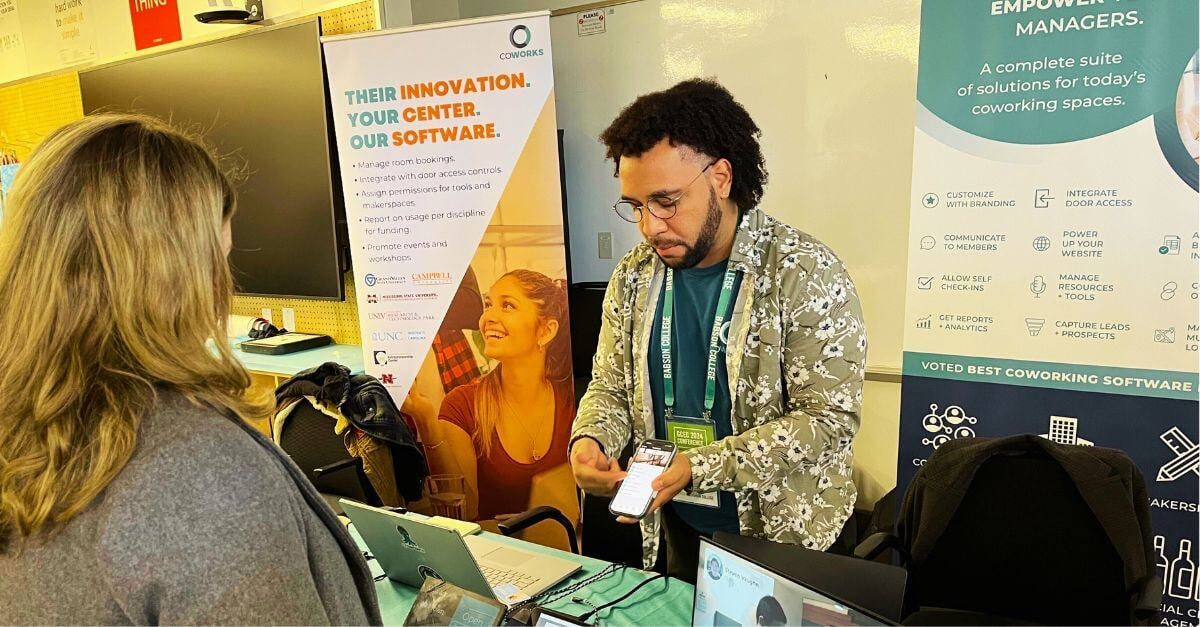Earlier this month, I had the privilege of attending the Global Consortium of Entrepreneurship Centers (GCEC) Annual Conference at Babson College in Boston.
This marked my third year at this event, and each time, I leave inspired. As in the past, I was joined by my colleague Phil Vanderwoude, and together, we soaked up insights that reinforced the deep connections between coworking communities and entrepreneurship centers.
If you're in the coworking space world like I am, you might not think of universities as our natural partners.
But here's the thing: the entrepreneurial energy within universities is a lot like what we see in coworking spaces.
Both thrive on community, collaboration, and a shared mission to build something meaningful. And when we bring coworking and entrepreneurship centers together, the potential for economic development and vibrant community relations becomes undeniable.
Here are a few standout lessons from the conference that coworking spaces—and the communities they serve—can learn from these incredible entrepreneurship centers.
Building community through proven impact
One session that stuck with me explored the 10-year impact of the delta V accelerator at MIT's Martin Trust Center for Entrepreneurship. Professors Daniela Ruiz Massieu and Claudia Gonzalez-Bramilla presented a longitudinal study that measured the outcomes of this program, and the numbers were striking.
- Over 61% of delta V projects have turned into real companies
- nearly 70% surviving their second five years.
- Participants have raised more than $1 billion in funding, created 130 additional companies, and raised another $2 billion along the way.
That’s not just a success story — it’s a movement.
The session didn’t just focus on the ventures themselves but highlighted the growth of individuals. Delta V alumni went on to lead with a commitment to principled entrepreneurship, with 89% of their ventures aligning with UN Sustainable Development Goals. They also showed the power of diversity, with teams led by women CEOs increasing from 23% to 39% over a decade.
The full report is here: entrepreneurship.mit.edu/delta-v-10-year-study/
For coworking spaces, this lesson is clear: impact creates community. When you show measurable success — whether it’s helping members scale their businesses, make key connections, or contribute to their communities — you’re not just offering space. You’re offering a platform for growth.

Student ambassadors: leaders in recruitment, and more
The session on Scaling activity in entrepreneurship centers highlighted the power of student ambassadors at the University of Connecticut.
Michaela Hartle shared how their student ambassadors were more than recruiters—they were role models, leaders, and community builders. They worked across campuses, hosting events, leveraging social media, and even presenting in classrooms. Ambassadors gained valuable professional skills like communication, networking, and collaboration, while inspiring their peers to engage with the university’s entrepreneurship programs.
This got me thinking about how coworking spaces can empower their own ambassadors — current members who are natural advocates. Who better to invite new members, host events, or share success stories than someone who knows and loves your community? By leveraging the authenticity of these advocates, coworking spaces can amplify their outreach and strengthen their member base.
Curating values-based relationships
Another session was led by Cheryl Kiser from Babson College’s Institute for Social Innovation, and focused on Building partnerships that matter. Cheryl talked about moving beyond transactional relationships to co-create connections that are meaningful and mutually beneficial. She shared her approach to creating partnerships that aren’t just functional but transformational.
Coworking spaces, take note. You are not just landlords or office managers. You’re community builders. When we prioritize partnerships—whether with local businesses, universities, or organizations that share our values—we’re setting the stage for deeper, more sustainable impact. It’s about focusing on the “who,” the “how,” and the “why,” rather than just the “what.”
Developing the whole person at e-centers
Dr. Gillian Barrett from University College Cork shared a model called Developing Your Entrepreneurial Mindshift.
This framework emphasized personal growth as much as entrepreneurial skills, focusing on creativity, resilience, and complex problem-solving. Her program helps students discover their “inner entrepreneur,” even if they don’t think of themselves that way yet. It’s a model that scales across disciplines, supporting students to think entrepreneurially and solve problems, no matter their field.
Coworking spaces can mirror this approach. While we often focus on the practical needs of our members — like Wi-Fi, coffee, or meeting rooms. But we also have a unique opportunity to support their personal and professional growth. Could we offer workshops on resilience? Host peer-to-peer mentoring? Create spaces where members feel safe to take risks and explore new ideas? When we do, we’re not just helping their businesses. We’re helping them.
What do coworking spaces and university entrepreneurship centers share?
At their core, entrepreneurship centers and coworking spaces share the same DNA. Both are about fostering connections, nurturing creativity, and building ecosystems where people can thrive.
Universities may focus on students, while coworking spaces cater to professionals. But the goals are strikingly similar: to create environments that inspire action, innovation, and growth.
The relationship between coworking and universities also presents incredible economic potential. Universities can be natural partners for coworking spaces—bringing students, faculty, and research into the fold. Together, they can become engines of local economic development, bridging the gap between academia and industry, and creating opportunities that wouldn’t exist otherwise.
Whether it’s the connections built in an accelerator like delta V, the leadership of student ambassadors, or the partnerships forged through shared values, the lessons apply to coworking spaces, too. We’re not just offering desks and offices — a where. We’re creating environments where ideas can grow, people can connect, and businesses can thrive.
At Coworks, we’re passionate about empowering coworking spaces to do just that. By learning from academic entrepreneurship centers, we can create communities that don’t just succeed but lead.
To all the coworking operators out there, let’s keep building. Together, we can create spaces where impact isn’t just a metric. It’s a movement.